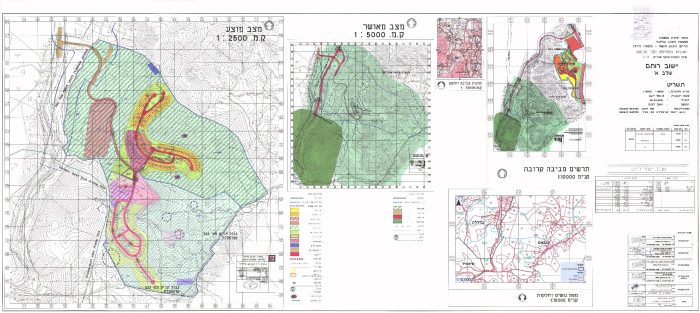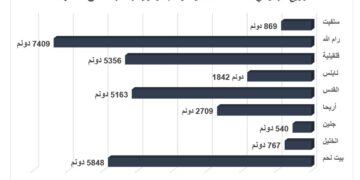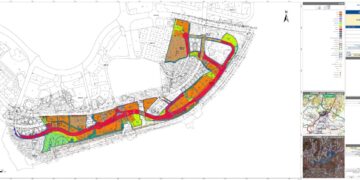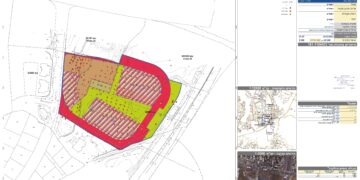- Violation: advertising new master plan
- Location: Khirbet Al-Farisiya- Northern Palestinian Jordan Valley
- Date: March 23, 2016
- Perpetrators: Planning and Construction Committee- Israel Civil Administration
- Victims: Bedouin people of the area
Details:
Government of the Israeli occupation worked hard to reinforce the establishment of colonies in the areas of the West Bank and Occupied Jerusalem through providing master plans that guarantee the prosperity and expansion of colonies. This is done to accommodate hundreds of colonists in years to come.
It should be marked that Rotem colony is one of the Israeli colonies of Al-Ghoor area that witnessed rapid expansion through confiscating lands and annexing them to the colony. This step occurred in synchronization with the new master plan proposed for the colony. The plan will use confiscated lands in 1980 on the claim of "security purposes" to build residential units, public facilities, governmental establishments touristic areas, and green areas well.
Photo 1: Rotem colony

Photo 2: the featured ad in AL-Quds newspaper

Photo 3: an aerial photo of the expansion location
Israeli official newspapers and the webpage of Israel Ministry of Interior featured on March 23, 2016 a new master plan for Rotem colony to be implemented on 1574.3 dunums. This area of land was confiscated in 1980 on claim of "Military purposes". Now, the lands will be used for residential expansion. According to the map attached to the plan, Israel Civil Administration divided the lands as follows:
|
Land classification |
Area\dunum |
|
Agricultural land |
1011.2 |
|
Residential area-A |
121.8 |
|
Tourism\ commercial |
94.1 |
|
Agro-tourism |
71.1 |
|
Existing road\suggested roads |
80.4 |
|
Architectural facilities |
9.3 |
|
Public open areas |
165.5 |
|
Industrial facilities |
20.9 |
|
Total |
1574.3 |

Photo 4: an aerial image illustrating the expansion location
The colony of Rotem was established in 1984 on the eastern mountains of al-Malih area that overlooks Jordan and al-Shri'a area. It used to be a military base for the Israeli occupation, which later changed into an agricultural colony located on more than 80 dunums. Despite that the colony does not have a huge population, yet its residents have higher privileges and services than other colonists elsewhere in. privileges are represented in agricultural lands, housing and the facility in marketing agricultural products. On the contrary, Palestinians area denied simplest rights such like the right to decent living of dignity.
Palestinian Jordan Valley:
The area of Palestinian Jordan Valley enjoys a strategic location, moderate climate, fertile soil and abundance of water.
As per location, the area is to the northeast of West Bank and extends from occupied city of Bisan to Jericho governorate in the south. It is edged by Jordan River from the east and Tubas and Nablus governorates from the west.
The total area of Palestinian Jordan Valley mounts up to 1,024,722 dunums, of which 13,000 dunums (1%) are the built-up area, where 62,876 inhabitants live in 27 Palestinian communities.
Land Research Center sees Israel continuous expansion on colonies in the West Bank and Jerusalem at the expense of Palestinian and lands a flagrant violation of Human Rights and all international laws and conventions, which prohibit disposition of public properties in occupied countries.
UN Resolutions
UN Security Council Resolution 242 of 1967: calls for
- the Withdrawal of Israel armed forces from territories occupied in the recent conflict;
- Termination of all claims or states of belligerency and respect for and acknowledgment of the sovereignty, territorial integrity and political independence of every State in the area and their right to live in peace within secure and recognized boundaries free from threats or acts of force." [4]
UN Security Council Resolution 449 of 1979: the Security Council determined:
- "that the policy and practices of Israel in establishing settlements in the Palestinian and other Arab territories occupied since 1967 have no legal validity and constitute a serious obstruction to achieving a comprehensive, just and lasting peace in the Middle East"
UN Security Council Resolution 452 of 1979: states that
- "the policy of Israel in establishing settlements in the occupied Arab territories has no legal validity and constitutes a violation of the Fourth Geneva Convention relative to the Protection of Civilian Persons in Time of War of 12 August 1949" and "calls upon the Government and people of Israel to cease, on an urgent basis, the establishment, construction and planning of settlements in the Arab territories occupied since 1967, including Jerusalem."
UN Security Council Resolution 465 of 1980:
- It expressed concern at Israeli settlement policy in the Arab territories and recalled resolutions 237 (1967), 252 (1968), 267 (1969), 271(1969) and 298 (1971). It further called upon the State and people of Israel to dismantle such settlements. The resolution calls on all states ‘not to provide Israel with any assistance to be used specifically in connection with settlements in the occupied territories’.
UN Security Council resolutions in regard to Israeli colonies:
UN Security Council resolution 446, article 3 " Calls once more upon Israel, as the occupying Power, to abide scrupulously by the 1949 Fourth Geneva Convention, to rescind its previous measures and to desist from taking any action which would result in changing the legal status and geographical nature and materially affecting the demographic composition of the Arab territories occupied since 1967, including Jerusalem, and, in particular, not to transfer parts of its own civilian population into the occupied Arab territories;"
- Un Security Council resolution 452, article 3"Calls upon the Government and people of Israel to cease, on an urgent basis, the establishment, construction and planning of settlements in the Arab territories occupied since 1967, including Jerusalem;"
-
Un Security Council resolution 465, Strongly deplores the continuation and persistence of Israel in pursuing those policies and practices and calls upon the Government and people of Israel to rescind those measures, to dismantle the existing settlements and in particular to cease, on an urgent basis, the establishment, construction and planning of settlements in the Arab territories occupied since 1967, including Jerusalem;
Calls upon all States not to provide Israel with any assistance to be used specifically in connexion with settlements in the occupied territories;
-
Un Security Council resolution 242, Affirms that the fulfilment of Charter principles requires the establishment of a just and lasting peace in the Middle East which should include the application of both the following principles:
(i) Withdrawal of Israel armed forces from
territories occupied in the recent conflict;
(ii) Termination of all claims or states of belligerency and respect for and acknowledgment of the sovereignty, territorial integrity and political independence of every State in the area and their right to live in peace within secure and recognized boundaries free from threats or acts of force;
Prepared by
The Land Research Center
LRC















